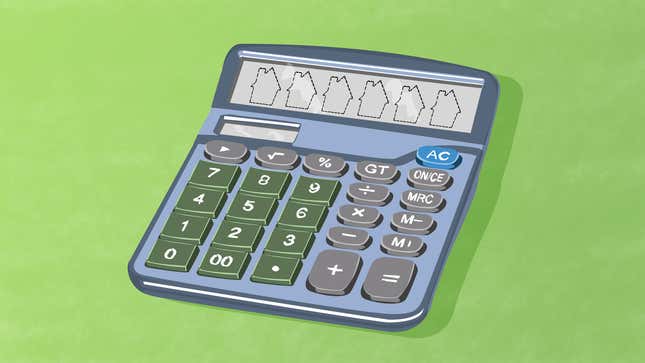
The first of the month is always a hit on your bank account. You know it’s coming, but that never makes it hurt any less. For most renters, that monthly check to the landlord is the largest expenditure you’ll make each month. But exactly how much of your hard-earned cash should you spend on rent?
The Gold Standard
For years, economists have sworn by the 30 percent rule: Renters should budget roughly 30 percent (or less) of their monthly income for rent. That number isn’t just for the physical space you’ll be inhabiting—you need to account for utilities, Internet, and renters insurance. (Don’t skimp on insurance: get it). “You probably shouldn’t pay much more than [30 percent of your income],” Stockton Williams, executive director of the Urban Land Institute’s Terwilliger Center for Housing, says. “If you do pay much more you’re probably housing cost burdened.”
But it depends! The rule is a good benchmark, not an absolution. “Having a general threshold that broadly addresses affordability is definitely a good idea,” Williams says. “Where it starts to become less useful is for an individual in making their own determination in how much they can and should pay for rent.”
Take Your Other Financial Burdens Into Account
I know plenty of people in New York City who shell out significantly more than I do on rent each month. But those people also have fewer monthly costs—like student loan payments and health insurance—on the other side of the ledger. It sounds absurdly self-evident, but you need to budget for the other shit in your life like food and credit card debt while calculating for rent.
“Consider adding up the monthly payments that you must contribute to each month, like any student loans, your metro pass or other transportation costs,” personal finance expert Farnoosh Torabi says. “Subtract that from your income and see what you’re left with. Instead of using a percentage from your overall take home pay, perhaps it’s more prudent to use up to 30 percent of the income left over on monthly rent.”
Prioritize What’s Important To You
This is hugely important. You’ll be coming home to your apartment—your home—after long, draining days of work. “Need is obvious: your health care, transportation, your utility bill,” Williams says. “There’s the budget management, then there are these fundamentally personal choices about what do I want?”
In the nine years I’ve lived in New York, I’ve preferred living with roommates in neighborhoods further from the city center that are typically cheaper. If you prefer to live alone and closer to the action—overpriced bars, fancy restaurants, excellent coffee shops—that’s a conscious financial decision, and one that will have a significant impact on your daily life.
The amount you spend on your apartment and where you live will directly correlate with how you live outside the space you call home. Specifically: You probably won’t have any leftover money to even enjoy those so-called amenities. You’re better off living in an apartment you can afford near excellent drinking establishments that align with your interests. Or, if you live in a smaller city without mass transit, what’s more important to you: A larger apartment or a shorter commute? There’s no right or wrong choice—just know what you want.
Don’t Listen to Real Estate Agents (Or Your Friends’ Rude Opinions)
Sure, you might be paying some shady landlord on the first of the month. But it’s your place. Don’t feel shameful because you picked a neighborhood deemed uncool by grubby real estate agents. Unless you spend all your time in bars, you’re going to spend the majority of your non-working life here. Who cares if your friends think there are lots of strollers in your neighborhood? Your idiot friend who lives in a hovel above a shitty bar with three other people isn’t living amongst the strollers, you are.
Remember, Budgeting Can Be Elastic
Sure, the 30 percent rule is a great place to start. And, yes, there are plenty of people who pay far more than 30 percent of their income on rent and are perfectly fine, just like there are scores of Americans who pay less than 30 percent on their rent and struggle to make ends meet. You make your budget. If you want to spend 45 percent of your income on rent, go super budget conscious on groceries, and only leave the house for work, you can. But you can’t buy drinks for all your coworkers—or a nice bottle of rye for your shoebox—and still have that big chunk of cash to fork over come the first of the month.
Bill Bradley is a writer and reporter living in Brooklyn. His work has appeared in GQ, Men’s Fitness, Runner’s World, Vanity Fair, and many others. Follow him on Twitter @billbradley3.
Art by Sam Woolley.
Adequate Man is Deadspin’s new self-improvement blog, dedicated to making you just good enough at everything. Suggestions for future topics are welcome below.